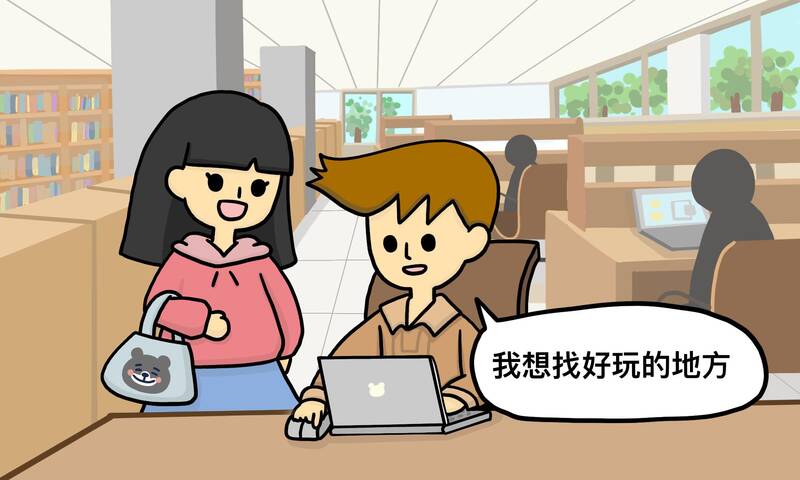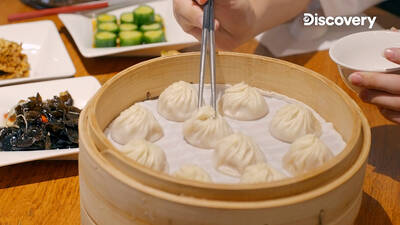對話 Dialogue
小實:馬克,你在做什麼?
Xiaoshi: Mǎkè, nǐ zài zuò shénme?

馬克:我在上網啊!我想找好玩的地方。
Make: Wǒ zài shàngwǎng a! Wǒ xiǎng zhǎo hǎowán de dìfāng.
小實:在學校附近嗎?
Xiaoshi: Zài xuéxiào fùjìn ma?
馬克:對啊,聽說美麗華有個很大的摩天輪,你去過嗎?
Make: Duì a, tīng shuō Měilìhuá yǒu ge hěn dà de mótiānlún, nǐ qùguò ma?
小實:我去過,美麗華不只有摩天輪,還有電影院、餐廳和商店。
Xiaoshi: Wǒ qùguò, Měilìhuá bù zhǐ yǒu mótiānlún, háiyǒu diànyǐngyuàn, cāntīng hàn shāngdiàn.
馬克:聽起來很不錯!你看,有網友說故宮博物院也很漂亮。
Make: Tīng qǐlái hěn búcuò! Nǐ kàn, yǒu wǎngyǒu shuō Gùgōng bówùyuàn yě hěn piàoliàng.
小實:故宮也在學校附近,要是你喜歡歷史,可以去參觀。
Xiaoshi: Gùgōng yě zài xuéxiào fùjìn, yàoshì nǐ xǐhuān lìshǐ, kěyǐ qù cānguān.
馬克:好,我上午去故宮參觀,下午去美麗華坐摩天輪。
Make: Hǎo, wǒ shàngwǔ qù Gùgōng cānguān, xiàwǔ qù Měilìhuá zuò mótiānlún.
翻譯Translation
Xiaoshi: Mark, what are you doing?
Mark: I’m surfing the internet! I’m looking for a fun place.
Xiaoshi: Is it near the campus?
Mark: Yes, It is said that Miramar has a huge Ferris wheel. Have you ever been there?
Xiaoshi: Yes, I have been there. Miramar is not only with a Ferris wheel, but also has cinemas, restaurants and shops.
Mark: Sounds great! See, some netizens said that the National Palace Museum is also very beautiful.
Xiaoshi: The Museum is also near the campus. If you like history, you may visit it.
Mark: Okay, I will visit the Palace Museum before noon and ride the Ferris wheel in Miramar in the afternoon.
單字片語Vocabulary
1. 上網(shàngwǎng) go online, to surf the Internet
2. 聽說 (tīng shuō) it is said that
3. 不只 (bùzhǐ) not only
4. 摩天輪 (mótiānlún) Ferris wheel
5. 網友 (wǎngyǒu) netizen
6. 歷史 (lìshǐ) history
7. 參觀 (cānguān) to visit
教材音檔 Audio Files
教材影片 Video Files:
https://www.instagram.com/celc.nou_tw/guide/_/17999106352646292/
實踐大學華語中心提供
By Shih Chien University Chinese Language Center: https://chineseusc.com/

US President Donald Trump has renewed his ambition to take control of Greenland for national security reasons and questioned whether Denmark has any legal right to the Arctic island. The debate has revived scrutiny of how Greenland became part of Denmark, its current self-rule and path to independence, and Washington’s military footprint. HOW DID DENMARK GET GREENLAND? Greenland was inhabited by Inuit peoples from Asia and North America intermittently from around 2,500 BC. Around 985 AD, Vikings led by Erik the Red settled in southern Greenland, farming and building churches. Around the same time, ancestors of today’s Inuit arrived, living as hunters

Owls have long fascinated people with their distinctive appearance and mysterious habits. These nocturnal birds possess large, round eyes and a flat facial disc. Their feathers come in shades of brown, gray, or white, helping them blend easily into the darkness. The most remarkable trait of owls is that they can turn their heads without damaging blood vessels. Contrary to popular belief, they can only rotate their heads up to 270 degrees, not 360 degrees. Owls have 14 cervical vertebrae, which is twice as many as humans. This special physical structure compensates for their inability to move their eyes within their

AI-generated summaries are shaking up the media world. Tools like Google’s AI Overviews now provide users with direct answers above the search results, resulting in fewer people clicking on news links. For publishers who rely on that traffic to generate advertising revenue, this shift is hitting hard. The fallout is measurable. Many sites have seen a sharp drop in traffic since AI summary features rolled out. An analysis revealed that a news outlet that had once ranked first on Google lost up to 79% of its traffic when its link appeared beneath an AI-generated summary. Statistics also show that

A: Bloomberg just released its annual travel guide, titled “25 Best Places to Travel in 2026.” What were the best Asian destinations? B: There were actually six Asian hotspots: Taiwan’s Taipei, Malaysia’s Penang, Kazakhstan’s Almaty, Indonesia’s Rote Island, India’s Tiger Reserves, and Oman. A: With its mix of traditional food and modern cuisine, Taipei has become a rising food capital in Asia. B: As Bloomberg reported, “Taiwan is a place that bubbles up in culinary conversation because of its famed beverage, bubble tea, and its early adoption of modern night markets.” A: And Din Tai Fung has now